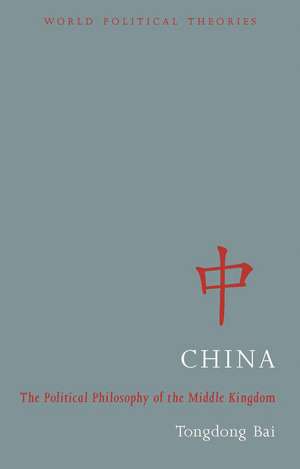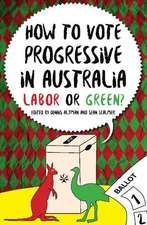China - The Political Philosophy of the Middle Kingdom
Autor Tongdong Baien Limba Engleză Paperback – 10 oct 2012
Chinese political traditions are often viewed negatively as 'authoritarian' (in contrast with 'Western' democratic traditions), but the historical reality is much more complex and there is a need to understand the political values shaping China's rise. Going beyond this, Bai argues that the debates between China's two main political theories - Confucianism and Legalism - anticipate themes in modern political thought and hence offer valuable resources for thinking about contemporary political problems.
Part of Zed's World Political Theories series, this groundbreaking work offers a remarkable insight into the political history and thought of a nation that is becoming increasingly powerful on the world stage.
Preț: 157.32 lei
Preț vechi: 172.07 lei
-9% Nou
Puncte Express: 236
Preț estimativ în valută:
30.11€ • 32.72$ • 25.31£
30.11€ • 32.72$ • 25.31£
Carte disponibilă
Livrare economică 31 martie-14 aprilie
Preluare comenzi: 021 569.72.76
Specificații
ISBN-13: 9781780320755
ISBN-10: 1780320752
Pagini: 216
Dimensiuni: 138 x 216 x 13 mm
Greutate: 0.23 kg
Editura: ZED BOOKS
Colecția Zed Books
Locul publicării:London, United Kingdom
ISBN-10: 1780320752
Pagini: 216
Dimensiuni: 138 x 216 x 13 mm
Greutate: 0.23 kg
Editura: ZED BOOKS
Colecția Zed Books
Locul publicării:London, United Kingdom
Cuprins
Introduction
1. Modernity before its time: the historical context of 'classical' Chinese political thought
2. The middle way of Confucianism: humanity as the new social glue
3. The middle way of Confucianism: equality-based mobile hierarchy
4. Daoism: return to an age of innocence
5. The Legalists: builders of modern bureaucracy and institutions
6. Later developments: the middle way
Conclusion: The contemporary relevance of traditional Chinese political philosophy
1. Modernity before its time: the historical context of 'classical' Chinese political thought
2. The middle way of Confucianism: humanity as the new social glue
3. The middle way of Confucianism: equality-based mobile hierarchy
4. Daoism: return to an age of innocence
5. The Legalists: builders of modern bureaucracy and institutions
6. Later developments: the middle way
Conclusion: The contemporary relevance of traditional Chinese political philosophy
Recenzii
“Bai’s volume is a welcome addition to the variety of introductory texts on Chinese philosophy that have recently or are about to hit the market. . . . Bai raises a range of thought-provoking ideas while very clearly demonstrating that the ideas of Chinese political thinkers from the Spring and Autumn and Warring States periods resonate with many contemporary issues in political philosophy and have the potential to provide us with interesting and in some cases extremely different ways of looking at political and social organization.”









